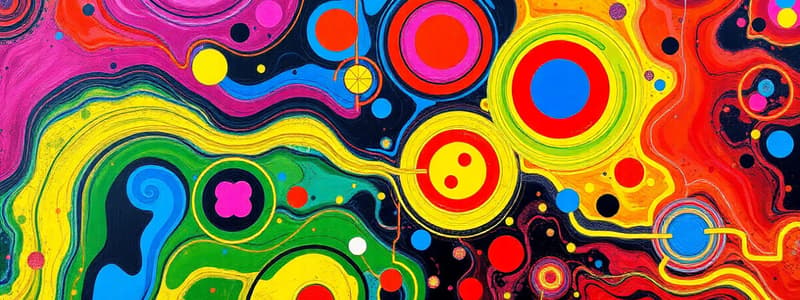Podcast
Questions and Answers
What receptor must be coactivated with 5-HT2A to generate the psychedelic response?
What receptor must be coactivated with 5-HT2A to generate the psychedelic response?
- 5-HT2C
- D2
- mGlu2 (correct)
- 5-HT1A
What is a common mystical experience reported by users of psychedelics?
What is a common mystical experience reported by users of psychedelics?
- Experiencing extreme fear and paranoia
- Feeling connected to nature without any beings
- Communicating with a benevolent, intelligent being (correct)
- Gaining insight into mathematics
Which class of psychedelics primarily interacts with the 5-HT2A and 5-HT2C receptors?
Which class of psychedelics primarily interacts with the 5-HT2A and 5-HT2C receptors?
- DMT
- Lysergic acids
- Phenethylamines (correct)
- Tryptamines
What represents an unexpected finding in neurophysiology during psychedelic experiences?
What represents an unexpected finding in neurophysiology during psychedelic experiences?
How do the probabilistic transition dynamics between functional states change under psychedelics?
How do the probabilistic transition dynamics between functional states change under psychedelics?
What percentage of atheist subjects identified as non-atheist after the use of psychedelics?
What percentage of atheist subjects identified as non-atheist after the use of psychedelics?
Which brain model is not included in the REBUS synthesis for understanding psychedelics?
Which brain model is not included in the REBUS synthesis for understanding psychedelics?
What is a significant psychological effect of psychedelics noted in studies?
What is a significant psychological effect of psychedelics noted in studies?
What percentage of subjects did not meet diagnostic criteria for PTSD after 18 months following three MDMA sessions?
What percentage of subjects did not meet diagnostic criteria for PTSD after 18 months following three MDMA sessions?
Which scale showed a significant decrease in functional impairment when comparing MDMA to placebo?
Which scale showed a significant decrease in functional impairment when comparing MDMA to placebo?
What has a protective effect against antisocial criminal behavior?
What has a protective effect against antisocial criminal behavior?
What is the primary effect responsible for the name 'dissociatives'?
What is the primary effect responsible for the name 'dissociatives'?
What is the main psychoactive molecule in Salvia Divinorum?
What is the main psychoactive molecule in Salvia Divinorum?
What effect do dissociatives primarily exert through NMDA antagonism?
What effect do dissociatives primarily exert through NMDA antagonism?
What kind of receptors does Salvinorin A primarily act upon?
What kind of receptors does Salvinorin A primarily act upon?
What subjective effect is commonly associated with high doses of dissociatives?
What subjective effect is commonly associated with high doses of dissociatives?
Which of the following statements about MDMA-assisted therapy is true?
Which of the following statements about MDMA-assisted therapy is true?
What can Salvia Divinorum’s effects vary significantly based on?
What can Salvia Divinorum’s effects vary significantly based on?
What neurotransmitters does MDMA primarily affect as a potent releaser?
What neurotransmitters does MDMA primarily affect as a potent releaser?
Which of the following is a characteristic effect of psilocybin?
Which of the following is a characteristic effect of psilocybin?
What compound is primarily responsible for the psychedelics in ayahuasca?
What compound is primarily responsible for the psychedelics in ayahuasca?
What distinguishes the 2C-x family of compounds?
What distinguishes the 2C-x family of compounds?
Which receptor types does MDMA have an affinity for as an agonist?
Which receptor types does MDMA have an affinity for as an agonist?
Which psychedelic is derived from the bufo alvarius toad?
Which psychedelic is derived from the bufo alvarius toad?
What is a significant risk associated with high doses of MDMA?
What is a significant risk associated with high doses of MDMA?
What is the primary use for 5-MeO-DMT, besides its natural occurrence in plants and toads?
What is the primary use for 5-MeO-DMT, besides its natural occurrence in plants and toads?
What is the primary mechanism by which optimization is negotiated in the Bayesian Brain Hypothesis?
What is the primary mechanism by which optimization is negotiated in the Bayesian Brain Hypothesis?
How does entropy relate to conscious states according to the Entropic Brain Hypothesis?
How does entropy relate to conscious states according to the Entropic Brain Hypothesis?
Which of the following results was observed in patients treated with psilocybin for terminal cancer according to said studies?
Which of the following results was observed in patients treated with psilocybin for terminal cancer according to said studies?
What effect do MDMA treatments have on individuals with severe social anxiety?
What effect do MDMA treatments have on individuals with severe social anxiety?
What were the palliative outcomes observed in patients with treatment-resistant depression after psilocybin sessions?
What were the palliative outcomes observed in patients with treatment-resistant depression after psilocybin sessions?
In a study of treatment-resistant patients, what dosages of psilocybin were administered over two sessions?
In a study of treatment-resistant patients, what dosages of psilocybin were administered over two sessions?
What is a characteristic of the increases in functional connectivity in the brain linked to psychedelic drug use?
What is a characteristic of the increases in functional connectivity in the brain linked to psychedelic drug use?
What two main change processes were identified in the context of psilocybin treatment for depression?
What two main change processes were identified in the context of psilocybin treatment for depression?
What is the primary pharmacological action of ibogaine in treating addictions?
What is the primary pharmacological action of ibogaine in treating addictions?
Which subjective effect is commonly associated with high doses of dextromethorphan (DXM)?
Which subjective effect is commonly associated with high doses of dextromethorphan (DXM)?
Which receptor interactions are involved in the effects of phencyclidine (PCP)?
Which receptor interactions are involved in the effects of phencyclidine (PCP)?
What effect can chronic use of ketamine lead to regarding brain chemistry?
What effect can chronic use of ketamine lead to regarding brain chemistry?
What effect does ibogaine have on glial derived neurotrophic factor (GDNF)?
What effect does ibogaine have on glial derived neurotrophic factor (GDNF)?
What is the common mode of administration for phencyclidine (PCP)?
What is the common mode of administration for phencyclidine (PCP)?
In the context of antidepressant effects, how long did it take on average for responders to relapse after ketamine infusion?
In the context of antidepressant effects, how long did it take on average for responders to relapse after ketamine infusion?
Which of the following subjective effects is NOT typically associated with ketamine use?
Which of the following subjective effects is NOT typically associated with ketamine use?
What is a key implication of using phencyclidine (PCP) in research?
What is a key implication of using phencyclidine (PCP) in research?
What neurotransmitter release does ketamine stimulate primarily in the mesocortical pathway?
What neurotransmitter release does ketamine stimulate primarily in the mesocortical pathway?
What is the most common method of administering LSD?
What is the most common method of administering LSD?
Which psychedelic is known for significantly increasing openness to experience after use?
Which psychedelic is known for significantly increasing openness to experience after use?
What psychological effect is NOT commonly associated with psychedelics?
What psychological effect is NOT commonly associated with psychedelics?
In the context of psychedelics, what does the term 'set' refer to?
In the context of psychedelics, what does the term 'set' refer to?
Which of the following effects on time perception is typically observed with psilocybin?
Which of the following effects on time perception is typically observed with psilocybin?
Which psychological effect is frequently associated with the emotional responses elicited by music during psychedelic experiences?
Which psychological effect is frequently associated with the emotional responses elicited by music during psychedelic experiences?
What was the primary purpose of the Marsh Chapel 'Good Friday' Experiment?
What was the primary purpose of the Marsh Chapel 'Good Friday' Experiment?
What effect does high dose psilocybin have on motion perception?
What effect does high dose psilocybin have on motion perception?
Which of the following changes in personality dimensions does psilocybin NOT appear to induce?
Which of the following changes in personality dimensions does psilocybin NOT appear to induce?
Which outcome is correlated with lifetime experiences with psychedelics?
Which outcome is correlated with lifetime experiences with psychedelics?
What characterizes the 'Integral Level' of psychedelic experience?
What characterizes the 'Integral Level' of psychedelic experience?
Which factor is NOT a part of the trip experience for psychedelics?
Which factor is NOT a part of the trip experience for psychedelics?
What is a common visual perception effect associated with psilocybin usage?
What is a common visual perception effect associated with psilocybin usage?
Flashcards
MDMA
MDMA
A potent releaser of monoamines (5-HT, DA, NE), often called 'ecstasy', that acts on transporter sites and receptors, but is neurotoxic at high doses.
Substituted Phenethylamines (DOM, DOI, DOB, DON, DOC)
Substituted Phenethylamines (DOM, DOI, DOB, DON, DOC)
Family of synthetic drugs with psychedelic effects. They differ in structure and intensity, with varying potency and risk.
Psilocybin (mushrooms)
Psilocybin (mushrooms)
A naturally occurring psychedelic compound found in certain mushrooms, converted into psilocin, with diverse effects on perception and cognition.
Bufotenin
Bufotenin
Signup and view all the flashcards
DMT (Dimethyltryptamine)
DMT (Dimethyltryptamine)
Signup and view all the flashcards
Ayahuasca
Ayahuasca
Signup and view all the flashcards
2C-x Family
2C-x Family
Signup and view all the flashcards
5-MeO-DMT
5-MeO-DMT
Signup and view all the flashcards
LSD
LSD
Signup and view all the flashcards
Psychedelic Experiences
Psychedelic Experiences
Signup and view all the flashcards
Set and Setting
Set and Setting
Signup and view all the flashcards
Psilocybin
Psilocybin
Signup and view all the flashcards
Half-life (Psychedelics)
Half-life (Psychedelics)
Signup and view all the flashcards
Mystical Experiences
Mystical Experiences
Signup and view all the flashcards
Binocular Rivalry
Binocular Rivalry
Signup and view all the flashcards
Nature Relatedness
Nature Relatedness
Signup and view all the flashcards
Openness to Experience
Openness to Experience
Signup and view all the flashcards
Emotional Empathy
Emotional Empathy
Signup and view all the flashcards
Psychological Distress
Psychological Distress
Signup and view all the flashcards
Time Distortion
Time Distortion
Signup and view all the flashcards
Sensory Realm
Sensory Realm
Signup and view all the flashcards
Recollective/Analytic Level
Recollective/Analytic Level
Signup and view all the flashcards
MKUltra
MKUltra
Signup and view all the flashcards
Visual Perception
Visual Perception
Signup and view all the flashcards
5-HT2A Receptor
5-HT2A Receptor
Signup and view all the flashcards
mGlu2 Receptor
mGlu2 Receptor
Signup and view all the flashcards
Phenethylamines
Phenethylamines
Signup and view all the flashcards
Tryptamines
Tryptamines
Signup and view all the flashcards
Ego-dissolution
Ego-dissolution
Signup and view all the flashcards
Default Mode Network (DMN)
Default Mode Network (DMN)
Signup and view all the flashcards
REBUS Model
REBUS Model
Signup and view all the flashcards
Probabilistic Transition Dynamics
Probabilistic Transition Dynamics
Signup and view all the flashcards
Entropic Brain Hypothesis
Entropic Brain Hypothesis
Signup and view all the flashcards
Free-Energy Principle
Free-Energy Principle
Signup and view all the flashcards
Bayesian Brain Hypothesis
Bayesian Brain Hypothesis
Signup and view all the flashcards
Entropy
Entropy
Signup and view all the flashcards
Psychedelic Effects: Increased Entropy
Psychedelic Effects: Increased Entropy
Signup and view all the flashcards
Clinical Applications of Psychedelics
Clinical Applications of Psychedelics
Signup and view all the flashcards
Amygdala Activity and Depression
Amygdala Activity and Depression
Signup and view all the flashcards
MDMA (Ecstasy) and Social Anxiety
MDMA (Ecstasy) and Social Anxiety
Signup and view all the flashcards
MDMA for PTSD
MDMA for PTSD
Signup and view all the flashcards
How does MDMA work for PTSD?
How does MDMA work for PTSD?
Signup and view all the flashcards
Dissociatives
Dissociatives
Signup and view all the flashcards
NMDA Antagonism
NMDA Antagonism
Signup and view all the flashcards
Salvia Divinorum
Salvia Divinorum
Signup and view all the flashcards
Salvinorin A Action
Salvinorin A Action
Signup and view all the flashcards
Salvia's Effects
Salvia's Effects
Signup and view all the flashcards
Psychedelics and Criminal Behavior
Psychedelics and Criminal Behavior
Signup and view all the flashcards
Psychedelics and Suicide
Psychedelics and Suicide
Signup and view all the flashcards
Psychedelic Treatment Potential
Psychedelic Treatment Potential
Signup and view all the flashcards
Ibogaine
Ibogaine
Signup and view all the flashcards
Ibogaine's Action
Ibogaine's Action
Signup and view all the flashcards
Dextromethorphan (DXM)
Dextromethorphan (DXM)
Signup and view all the flashcards
Phencyclidine (PCP)
Phencyclidine (PCP)
Signup and view all the flashcards
Ketamine
Ketamine
Signup and view all the flashcards
Ketamine's Effects
Ketamine's Effects
Signup and view all the flashcards
Ketamine & Depression
Ketamine & Depression
Signup and view all the flashcards
Dissociative Effects
Dissociative Effects
Signup and view all the flashcards
Abuse Potential
Abuse Potential
Signup and view all the flashcards
Study Notes
Psyc 383: Lecture 9 - Hallucinogens
- Psychopharmacology lecture covering hallucinogens, specifically psychedelics and dissociatives.
The Liminality Crisis
- Liminal states of mind are subjective crisis points, representing the apex of uncertainty in perception or belief.
- Individuals experience challenges to their assumptions about reality during these states.
- Questions arise such as whether the mind is perceiving or creating reality, the boundaries between self and environment, and the nature of one's identity.
- Possible outcomes of intense liminal crises include panic, paranoia, denial, surrender, (pan-)agnosticism, and courage/wisdom.
Psychedelics
- The key feature distinguishing psychedelic agents from other drugs is their reliable ability to induce altered perceptions, thoughts, and feelings, typically not experienced otherwise, except in dreams or times of religious exaltation (Jerome Jaffe, 1990).
Drugs and Dream Similarity (Sanz et al., 2018)
- Studies show similarities between drug-induced states and dream states.
- Graphs and data visualizations illustrate the degree of similarity between different substances and dream states, categorized by classes of psychedelic drugs.
Brief History of Psychedelics
- The timeline traces the isolation, synthesis and discovery of various psychedelic drugs (mescaline, psilocin/psilocybin, LSD, and ketamine)
- Key figures and dates are highlighted highlighting developments in their synthesis, initial studies, clinical trials, regulation, and their status.
History of Psychedelics
- Psychedelics have been used by indigenous cultures for millennia.
- The term "psychedelic" was coined by Humphrey Osmond and Aldous Huxley.
- Key milestones include the isolation of mescaline, the synthesis of MDMA, and LSD, as well as their history of use in therapy.
Clinical History of Psychedelics
- Early researchers termed psychedelics "psychotomimetics" due to their ability to induce schizophrenic-like symptoms.
- Clinical applications include the treatment of alcoholism and other addictions, autism, and couples counseling.
Classes of Psychedelic Drugs
- Two primary structural classes, phenethylamines and tryptamines, differ in minor functional details.
Phenethylamines: Mescaline
- Mescaline is a prototypical psychedelic phenethylamine found in cacti (peyote and San Pedro).
- It has a half-life of approximately 6 hours.
- Commonly used and legally protected in certain Native American religious practices.
- Introduced to Western society by Aldous Huxley, who described experiences of visual fractals, synaesthesia, and altered time perception.
Phenethylamines: MDMA, MDA, etc.
- Often referred to as entactogens.
- Potent releasers of monoamines (serotonin, dopamine, norepinephrine).
- Exhibit affinity for various receptors, including serotonin and dopamine receptors.
- Can be neurotoxic at high doses.
- Associated with effects like euphoria, increased empathy, and emotional contagion.
Substituted Phenethylamines
- The 2C-X family of compounds have similar structures but vary in the placement of the substituent group on the aromatic ring.
- NBOMe compounds are also in this family but have a benzyl ring, resulting in a change in affinities.
Tryptamines: Psilocybin
- Naturally derived from the psilocybe genus of mushrooms.
- Psilocybin rapidly converts to psilocin (psychoactive).
- Considered one of the least harmful illegal drugs.
- Found in various religious or cultural practices.
- About 12% of North American adults have used psilocybin.
Tryptamines: Bufotenin
- Found in the skin secretions of the Sonoran desert toad (Bufo alvarius).
- A psychedelic tryptamine.
- Similar properties to other tryptamines but less commonly used due to the difficulty in obtaining the toad.
Tryptamines - DMT, 5-MeO-DMT
- Ayahuasca is a brew used by indigenous South American peoples to induce psychedelic effects.
- Contains DMT as a primary psychoactive constituent, along with harmine/harmaline (MAO inhibitors).
- 5-MeO-DMT is also found in various plants and other species.
Lysergic Acid Diethylamide (LSD-25)
- Naturally derived from a fungus that infects rye.
- Key event: "Bicycle Day" when Albert Hofmann accidentally discovered LSD's psychedelic effects.
Bicycle Day - April 19, 1943
- Albert Hofmann's experience on April 19, 1943, when he first explored the psychedelic effects of LSD.
LSD
- The substance derived from ergot, a fungus.
- Different forms exist (e.g., crystallized, blotter paper).
- Has varied uses from a therapeutic perspective to illicit uses due to its diverse effects.
Psychological Effects of Psychedelics
- Experiences vary depending on dose, setting, and individual factors.
- Qualitative experience patterns across different psychedelic substances include peak experiences, afterglow, and residual effects.
- Many experiences are significantly related to altered states of consciousness, frequently accompanied by mystical or ecstatic states.
- Some experience anxiety and despair.
Psychological Effects: Perception
- Visual perception can be affected, including binocular rivalry, color enhancement, and changes in visual perception due to drug use.
- Changes in time perception, auditory perceptions (e.g., heightened responses to music), and sleep (including REM cycles and slow-wave sleep).
Psychological Effects: Personality
- Psilocybin use leads to significant increases in openness to experience.
- Follow-up studies show increased extraversion and conscientiousness, and some decrease in neuroticism potentially due to the substance.
Psychedelics and Nature-Relatedness
- Studies have shown a link between psychedelic use and heightened nature-relatedness.
- Psychological dimensions of nature-relatedness increased after psilocybin use.
- Authoritarianism/liberalism views also change.
Psychological Effects: "Mystical"
- Psychedelic experiences often involve a sense of profound understanding, self-transformation, and connection with a higher power/reality.
- A wide range of mystical experiences can be induced, frequently resulting in a sense of religious or spiritual significance.
- Several studies compare the mystical experience to that of non-drug users.
Mechanisms of Action
- Psychedelic drugs act as agonists for the 5-HT2A receptors.
- This action, while necessary, isn't sufficient for their effect.
- Different psychedelic classes have varying pharmacological properties affecting receptors in different ways.
Neurophysiology
- Psychedelics impact brain regions like the thalamus, ACC, PCC, and medial prefrontal cortex, influencing areas related to ego-dissolution or ego-loss.
- Functional connectivity changes.
- Patterns differ and can be measured and analyzed.
Novel Functional Dynamics
- Psychedelics fundamentally change the transition dynamics between brain states.
- A significant change in the probabilistic state transitions occur both before and after psychedelic use.
REBUS - Relaxed Beliefs Under Psychdelics
- This is a recently proposed model of how psychedelics work.
- It incorporates elements of the Free-Energy Principle, Hierarchical Predictive Coding, Bayesian Brain Hypothesis, and Entropic Brain Hypothesis.
Hierarchical Predictive Coding
- This model of brain function involves hierarchical levels processing bottom-up sensory data and top-down predictions, with psychedelics altering sensory data.
The Entropic Brain Hypothesis
- Conscious states can be placed on a spectrum from rigid to flexible, represented by entropy levels.
- Increased functional connectivity is associated with psychedelic use.
Clinical Applications: Anxiety & Depression
- Studies show significant reductions in anxiety and depression, particularly in end-of-life scenarios or treatment-resistant patients. Clinical improvements in psychological outcomes.
Clinical Applications: Depression
- Studies show significant depressive symptom reductions in treatment-resistant patients following psilocybin treatment and psychotherapy.
Clinical Applications: PTSD
- MDMA treatment is being researched and shows promise as a potential therapy for patients with PTSD where the effects persist over a long period.
- Changes in symptoms such as functional impairment, and mental wellbeing, are documented.
Biopsychosocial Healing
- Psychedelic uses are potentially linked to psychological outcomes, such as reduced crime, altered suicidality among women, and improved mental health in general.
Dissociatives
- Dissociatives are substances that produce feelings of detachment from self, environment, and reality, often characterized by significant psychological effects.
Salvia Divinorum
- A plant native to Oaxaca, Mexico, with the psychoactive compound salvinorin A, an opioid к receptor agonist.
Ibogaine
- A plant-derived compound with pharmacology in treatment-resistant addictions, often notably alcohol and opioid addictions.
Dextromethorphan (DXM)
- A common over-the-counter cough medicine with opioid-like and PCP-like characteristics and potential antidepressant effects at higher doses.
Phencyclidine (PCP)
- A potent dissociative with high abuse potential, affecting NMDA receptors and other neurotransmitter systems. Affects brain areas and associated with subjective and behavioral effects.
Ketamine
- A dissociative, often used for medical sedation.
- There is ongoing research on its potential for treating depression and other mood disorders, potentially associated with neurotoxic effects at high doses.
Studying That Suits You
Use AI to generate personalized quizzes and flashcards to suit your learning preferences.




